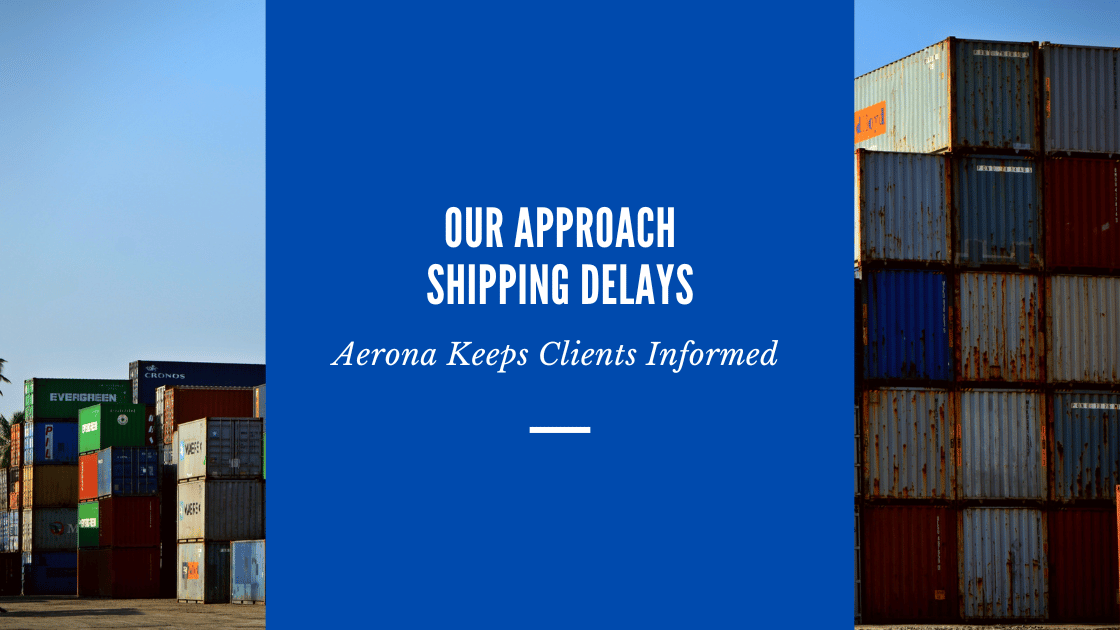Tel: 0161 652 3443 | Email: sales@aeronacca.co.uk
The Current Situation
In recent weeks, shipping delays in Singapore have more than doubled, sparking justifiable concerns about potential price hikes for importers and consumers alike.
At Aerona, we always try to plan ahead. We provide updates like this to enable proactive action, rather than to increase anxieties amongst our clients. Whilst the news wasn’t well received in the shipping industry, Chinese exporters and other exporters in the region have acted quickly in adapting to the changes.
An Approaching Crisis
Observers are warning that the shortage of container ships and port congestion throughout Asia (but significantly affecting Singapore) could signify an approaching supply chain crisis.
PSA Singapore, the leading port operator, is actively collaborating with shipping lines to try to counter disruptions. Thinking creatively about shipping is one solution, with importers looking at shipping earlier than planned, or using slower routes to keep costs as low as possible.
Proactive Communication
By proactively communicating with vessels regarding arrival times and volume information, PSA aims to mitigate the repercussions of the current volatility.
As the situation develops, PSA has emphasised the necessity of enhancing and maximising terminal capacity. They also plan to implement smart technologies to address the challenges. Other suggestions include using alternative routes, or even looking at Chine to Europe freight train services.
A Combination of Causes
The disruptions at Singapore’s ports stem from a combination of factors, ranging from diversions due to unrest in the Red Sea, to Chinese exporters hastening shipments ahead of impending trade restrictions.
The recent announcement by the United States to raise tariffs on imports from China, targeting strategic sectors like electric vehicles (EVs), batteries, steel and critical minerals, has further exacerbated the situation. Whatever the cause and implications though, it’s time for shipping companies, importers and the wider business community to start thinking proactively.
Significant Pressure
For freight forwarders handling substantial goods such as cars, the shipping costs have increased three-fold, adding significant financial pressure.
Analysts are predicting prolonged repercussions, potentially lasting for months, and impacting neighbouring Southeast Asian ports. The main concern is that this extends into peak shipping season.
Impact on Manufacturers
Key industries affected include manufacturing firms, particularly those engaged in producing heavy goods like consumer electronics and EVs.
These industries are reliant on sea freight for the transportation of essential raw materials.
Inflation Increase Expected
Economist Barnabas Gan highlighted that the ongoing container shortages, combined with robust growth momentum, are expected to drive inflation upwards in Singapore.
Initially, a slowdown in price escalation was anticipated in the second half of the year, however the current landscape has raised real uncertainty regarding this projection.
Reshaping the Economic Landscape
The challenges in the shipping industry are reshaping the economic landscape in Singapore, necessitating swift and strategic measures to navigate the complex supply chain disruptions.
As stakeholders brace for continued volatility, the repercussions of these delays are reverberating across a wide range of sectors. This reinforces the need to build resilient and adaptive frameworks to weather the storm of shipping uncertainties.
Aerona Keeps Clients Informed
Aerona helps our clients do just that, as we keep them informed with any industry updates that could affect the speed, cost or viability of their imports.
Challenges such as this developing situation can not necessarily be avoided. However, with Aerona as your customs clearing agent, they can be navigated proactively and with a positive outcome.

